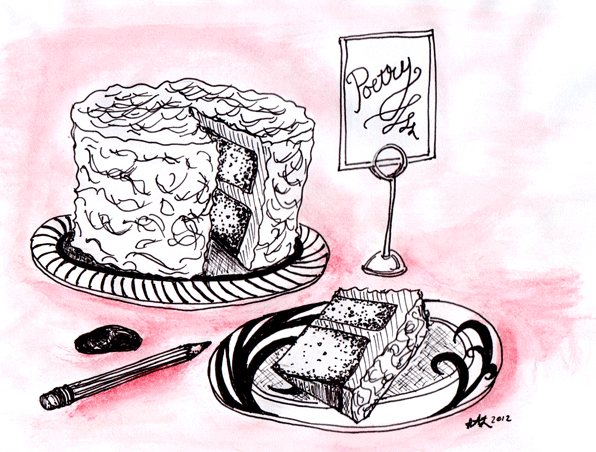
Guest Curated By Neil Aitken
For this installment of “On Poetry Potlucks,” our guest curator Neil has invited Elaine Wang, one of the guests at his very first poetry potluck (and an LR Issue 1 contributor), to reflect upon her experience. In today’s post, Elaine regales us with a tale of cake; rocks and mysterious masseuses; and the solace that she found through the group of sympathetic strangers gathered there.
* * *
There is so much cake.
I am at Neil’s first ever poetry potluck, and I’m mostly wondering how three people are going to eat two full-sized cakes. And these are optimal condition cakes—one is a green tea roll with icing inside and the other gently sandwiches layers of jellied fruit.
I think I ate four pieces of cake that night, and that was just dessert. Neil had made his famous sweet potato dumplings for dinner.
But more on the poetry part and less on the potluck part—after spending some time catching up and getting to know one another, Neil led Ngoc and I through a generative writing exercise designed to find the “heart of the poem” through bringing together seemingly disparate pieces of our lives and finding their points of contact.
I learned that I am obsessed with doors and a rock. Not rocks, a single small, smooth rock. Namely, the scented, wet rock a massage therapist had laid in the hole where my clavicles meet after an almost two and a half hour massage. The massage was only supposed to be an hour and a half, but the massage therapist later commented that he had lost track of time because he had been so immersed in working on my body because it was in one of the best conditions of his clients (at this point of my life, I had been dancing more regularly in jazz and ballet). I had felt it, too. The whole session felt like a weird, non-sexual but completely physical communion. For the next two weeks I was wracked with the following questions: Did he just leave rocks in everyone’s necks? Was this a secret come-on, since it’s so taboo in professional massage therapist/client relations? If I went back to try and find him (I didn’t know his name, and I got the massage through a Groupon), would they throw me out and would I be tagged on some sort of creeper list?
Ngoc told me straight-out, no holds barred, that I should go back and find him. Remember, this is a woman I just met that night. After I confided this story, she didn’t judge me, she didn’t think I was a creeper, and she didn’t even find it weird that I was obsessing over it (I am, by nature, an obsessive person). Neil didn’t think I should go find him, but he agreed with her that this absolutely should be in a poem, somehow.
This is the true genius of poetry potlucks—I can meet strangers that get me. I can meet friends that get me. And I can talk with them about the freaky, creepy, scary, crazy things that life, and therefore poems, are made of, and these people understand and welcome that. This doesn’t happen in “real” life. Sadly, it’s even rare in the workshops and classes that I have experienced. I think part of the acceptance and camaraderie comes from the potluck part, from the cakes and the dumplings. If you’re a decent human being, it’s almost impossible to not be kind with people with whom you’ve just broken bread. You’ve already shared something tangible, given and received nourishment in a physical way. The potluck is a prototype of sorts, an unconscious pattern of customs already set in place for the second half of the evening, the more vulnerable part. The small number of attendees also helps make it a more intimate setting. Most of the prose and poetry workshops I’ve been in have been in more formal, academic environments and therefore always carried an undercurrent of competition. In one particularly cutthroat workshop I attended, everyone wanted to be THE most brilliant writer in the room, and also THE most witty critic. This led to harsh criticism on every piece that everyone submitted—I remember one person mockingly said, as feedback, that my story was exactly like “Dawson’s Creek.” Maybe the story did have some resemblance (I’ve never watched that show, so I have no bearing on the feedback’s veracity), but looking back, it’s easy to see the comment was said to incite laughs—it’s harder to see how it was helpful to me, the writer. Isn’t that supposed the whole point of a workshop? Isn’t it supposed to be of help to the writer?
Workshops are hard. It’s scary to share your work. It’s painful to hear criticism. It’s tiring to read others’ work with a critical yet gentle eye, all the while also taking the time to get to know individual voice and style. To say things that are actually helpful. To join in the collaborative dance of helping each other dig out the heart of the work from what’s already on the page. But somehow, it’s a lot easier when there’s food and friends.
* * *
Elaine Wang holds a BA in English with an emphasis on creative writing. Originally from Texas, she now lives and writes in Los Angeles. She never went back to find the aforementioned man.
To see the other posts in Neil Aitken’s guest-curated series, “On Poetry Potlucks,” click here.